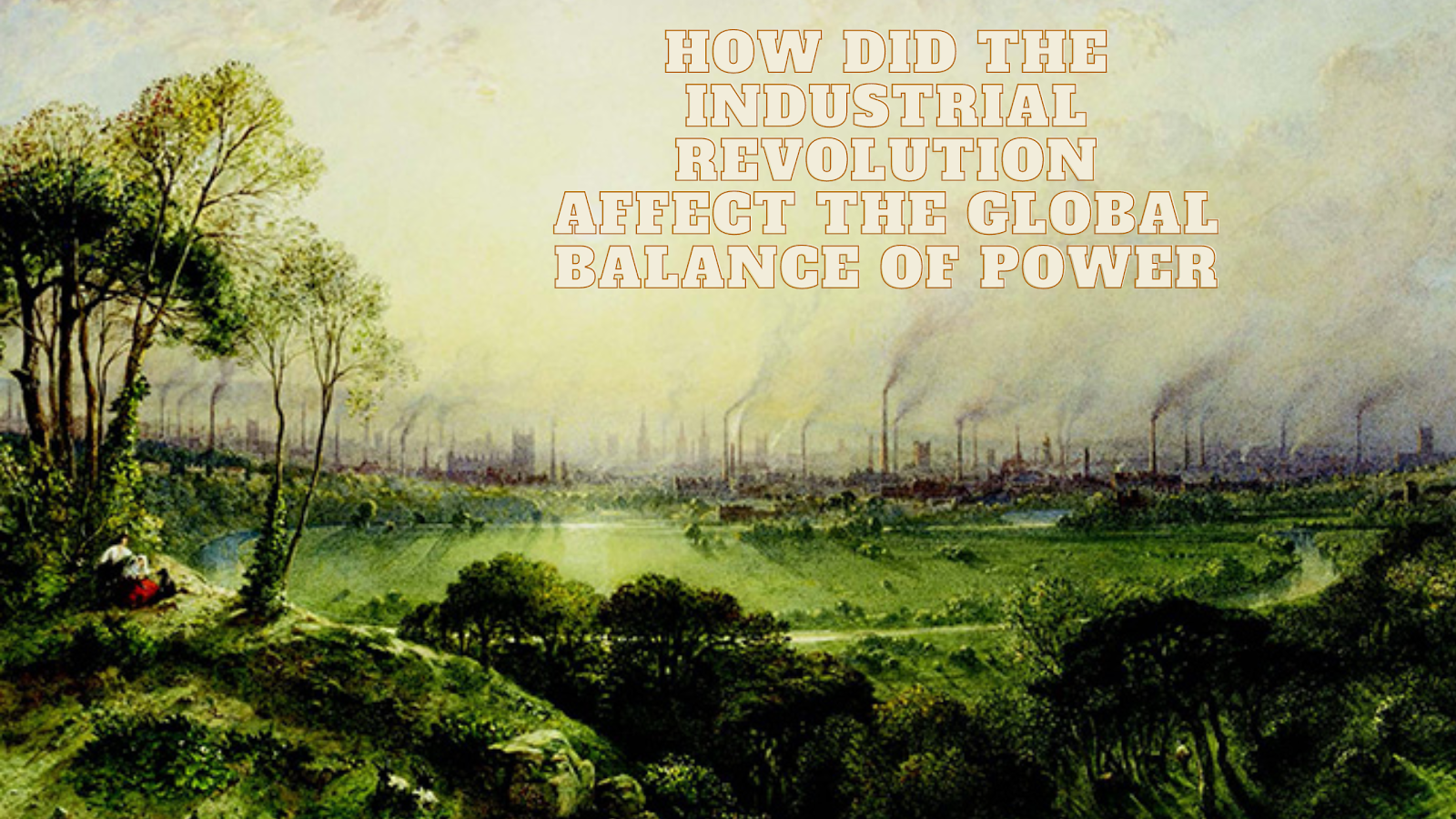How did the Industrial Revolution affect the
global balance of power
The Industrial Revolution, which
began in Britain in the late 18th century and spread to other parts of the
world over the next century, had a profound impact on the global balance of
power. The Revolution led to the emergence of new economic and political
systems, which helped to reshape the international balance of power and set the
stage for the modern era.
One way in which the
Industrial Revolution impacted the global balance of power was through the
rapid expansion of industrialization and capitalism. The Industrial Revolution
led to the development of new machinery and technology, which paved the way for
the growth of large-scale factories and mass production. This, in turn, led to
the growth of new industries and the creation of new wealth, which helped to
fuel economic growth and expand the power of nations such as Britain, Germany,
and the United States.
As a result of the
expansion of industrialization and capitalism, the global balance of power
began to shift away from traditional empires and monarchies towards modern
democratic states. The growth of industrialization and capitalism also led to
the rise of new mercantilist powers, such as the United States and Japan, which
sought to compete with traditional European powers for global influence and
resources.
In addition, the
Industrial Revolution had a significant impact on military power and strategy.
The introduction of new technologies such as the steam engine, steel, and the
telegraph helped to change the nature of warfare and make it more efficient and
deadly. This, in turn, helped to reinforce the power of industrialized states
and contributed to the growth of militarism, imperialism, and nationalism.
The Industrial
Revolution also had significant social repercussions, including the growth of
urbanization, the rise of the working class, and the emergence of new social
and political movements. These changes helped to challenge traditional power
structures and set the stage for the emergence of more democratic and
egalitarian societies.
In conclusion, the
Industrial Revolution had a profound impact on the global balance of power,
helping to shift the balance away from traditional empires and towards modern
industrialized states. The expansion of industrialization and capitalism,
changes in military power and strategy, and social and political changes were
all key factors in this transformation. The legacy of the Industrial Revolution
can still be felt today, as the global balance of power continues to shift and
the world adapts to new economic and technological challenges.
কীভাবে শিল্প বিপ্লব বিশ্বব্যাপী
ক্ষমতার ভারসাম্যকে প্রভাবিত করেছিল
শিল্প বিপ্লব,
যা 18 শতকের শেষের দিকে ব্রিটেনে শুরু হয়েছিল এবং পরবর্তী শতাব্দীতে বিশ্বের অন্যান্য
অংশে ছড়িয়ে পড়েছিল, শক্তির বৈশ্বিক ভারসাম্যের উপর গভীর প্রভাব ফেলেছিল। বিপ্লব
নতুন অর্থনৈতিক ও রাজনৈতিক ব্যবস্থার উত্থানের দিকে পরিচালিত করে, যা ক্ষমতার আন্তর্জাতিক
ভারসাম্যকে পুনর্নির্মাণ করতে সাহায্য করে এবং আধুনিক যুগের জন্য মঞ্চ তৈরি করে।
একটি উপায় যেখানে
শিল্প বিপ্লব শক্তির বৈশ্বিক ভারসাম্যকে প্রভাবিত করেছিল তা হল শিল্পায়ন এবং পুঁজিবাদের
দ্রুত সম্প্রসারণের মাধ্যমে। শিল্প বিপ্লব নতুন যন্ত্রপাতি ও প্রযুক্তির বিকাশের দিকে
পরিচালিত করে, যা বড় আকারের কারখানা এবং ব্যাপক উৎপাদনের বিকাশের পথ তৈরি করে। এর
ফলে, নতুন শিল্পের বৃদ্ধি এবং নতুন সম্পদের সৃষ্টি হয়, যা অর্থনৈতিক প্রবৃদ্ধিকে ত্বরান্বিত
করতে এবং ব্রিটেন, জার্মানি এবং মার্কিন যুক্তরাষ্ট্রের মতো দেশগুলির শক্তি প্রসারিত
করতে সহায়তা করে।
শিল্পায়ন ও পুঁজিবাদের
প্রসারের ফলে, শক্তির বৈশ্বিক ভারসাম্য ঐতিহ্যগত সাম্রাজ্য ও রাজতন্ত্র থেকে আধুনিক
গণতান্ত্রিক রাষ্ট্রের দিকে সরে যেতে থাকে। শিল্পায়ন এবং পুঁজিবাদের বৃদ্ধি মার্কিন
যুক্তরাষ্ট্র এবং জাপানের মতো নতুন বাণিজ্যবাদী শক্তির উত্থানের দিকে পরিচালিত করে,
যারা বিশ্বব্যাপী প্রভাব এবং সম্পদের জন্য ঐতিহ্যবাহী ইউরোপীয় শক্তিগুলির সাথে প্রতিযোগিতা
করতে চেয়েছিল।
উপরন্তু, শিল্প
বিপ্লব সামরিক শক্তি এবং কৌশলের উপর উল্লেখযোগ্য প্রভাব ফেলেছিল। বাষ্প ইঞ্জিন, ইস্পাত
এবং টেলিগ্রাফের মতো নতুন প্রযুক্তির প্রবর্তন যুদ্ধের প্রকৃতি পরিবর্তন করতে এবং এটিকে
আরও দক্ষ এবং মারাত্মক করে তুলতে সহায়তা করেছিল। এটি, ঘুরে, শিল্পোন্নত রাষ্ট্রগুলির
শক্তিকে শক্তিশালী করতে সাহায্য করে এবং সামরিকবাদ, সাম্রাজ্যবাদ এবং জাতীয়তাবাদের
বৃদ্ধিতে অবদান রাখে।
শিল্প বিপ্লবেরও
উল্লেখযোগ্য সামাজিক প্রতিক্রিয়া ছিল, যার মধ্যে নগরায়নের বৃদ্ধি, শ্রমিক শ্রেণীর
উত্থান এবং নতুন সামাজিক ও রাজনৈতিক আন্দোলনের উত্থান। এই পরিবর্তনগুলি ঐতিহ্যগত ক্ষমতা
কাঠামোকে চ্যালেঞ্জ করতে এবং আরও গণতান্ত্রিক ও সমতাবাদী সমাজের উত্থানের মঞ্চ তৈরি
করতে সাহায্য করেছিল।
উপসংহারে, শিল্প
বিপ্লব বিশ্বব্যাপী ক্ষমতার ভারসাম্যের উপর গভীর প্রভাব ফেলেছিল, ভারসাম্যকে ঐতিহ্যগত
সাম্রাজ্য থেকে দূরে সরিয়ে আধুনিক শিল্পোন্নত রাষ্ট্রের দিকে নিয়ে যেতে সাহায্য করে।
শিল্পায়ন এবং পুঁজিবাদের বিস্তার, সামরিক শক্তি ও কৌশলের পরিবর্তন এবং সামাজিক ও রাজনৈতিক
পরিবর্তনগুলি এই রূপান্তরের মূল কারণ ছিল। শিল্প বিপ্লবের উত্তরাধিকার আজও অনুভব করা
যেতে পারে, কারণ বিশ্বব্যাপী ক্ষমতার ভারসাম্য পরিবর্তন হতে থাকে এবং বিশ্ব নতুন অর্থনৈতিক
ও প্রযুক্তিগত চ্যালেঞ্জের সাথে খাপ খাইয়ে নেয়।






No comments:
Post a Comment